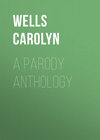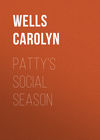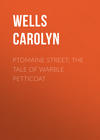Buch lesen: «A Parody Anthology»
NOTE
Acknowledgment is hereby gratefully made to the publishers of the various parodies for permission to include them in this compilation.
The parodies from “Diversions of the Echo Club," by Bayard Taylor, and Mary and Her Lamb, from “New Waggings of Old Tales," by Frank Dempster Sherman, are published by permission of Messrs. Houghton, Mifflin & Company.
By the courtesy of John Lane are included the parodies of Anthony C. Deane, from his volume “New Rhymes for Old;" and those of Owen Seaman, from volumes “In Cap and Bells" and “The Battle of the Bays."
Bed During Exams is from “Cap and Gown," published by Messrs. L. C. Page & Company.
The Golfer's Rubaiyat, by H. C. Boynton, is from “A Book of American Humorous Verse," published by Messrs. Herbert S. Stone & Company.
Staccato to O Le Lupe is from “Last Scenes from Vagabondia," by Bliss Carman and Richard Hovey, published by Messrs. Small, Maynard & Company.
The two poems by Ben King are published by Forbes & Co.
The following are published by Charles Scribner's Sons: Song, from “The Book of Joyous Children," by James Whitcomb Riley; Home Sweet Home, and Imitation, from “Poems" of H. C. Bunner; and Song of a Heart, and Godiva, from “Overheard in a Garden," by Oliver Herford.
INTRODUCTION
PARODY AS A FINE ART
THE fact that parody has been ably defended by many of the world's best minds proves that it is an offensive measure, at least from some viewpoints. But an analysis of the arguments for and against seems to show that parody is a true and legitimate branch of art, whose appreciation depends upon the mental bias of the individual.
To enjoy parody, one must have an intense sense of the humorous and a humorous sense of the intense; and this, of course, presupposes a mental attitude of wide tolerance and liberal judgments.
Parodies are not for those who cannot understand that parody is not necessarily ridicule. Like most other forms of literature, unless the intent of the writer be thoroughly understood and appreciated, the work is of little value to the reader.
The defenders of parody have sometimes endeavored to prove that it has an instructive value, and that it has acted as a reforming influence against mannerisms and other glaring defects. One enthusiastic partisan confidently remarks: “It may gently admonish the best and most established writer, when, from haste, from carelessness, from over-confidence, he is in danger of forfeiting his reputation; it may gently lead the tyro, while there is yet time, from the wrong into the right path." But this ethical air-castle is rudely shattered by facts, for what established writer ever changed his characteristic effects as a result of the parodies upon his works, or what tyro was ever parodied?
It has been said, too, that a good parody makes us love the original work better; but this statement seems to lack satisfactory proof except, perhaps, on the principle that a good parody may lead us to know the original work more thoroughly.
Perhaps the farthest fetched argument of the zealous advocates of the moral virtues of parody is found in Lord Jeffrey's review of the well-known “Rejected Addresses," where he says, “The imitation lets us more completely into the secret of the original author, and enables us to understand far more clearly in what the peculiarity of his manner consists than most of us would ever have done without this assistance." If this be true at all, it is exemplified in very few instances, and is one of the least of the minor reasons for the existence of a parody.
The main intent of the vast majority of parodies is simply to amuse; but to amuse intelligently and cleverly. This aim is quite high enough, and is in no way strengthened or improved by the bolstering up qualities of avowed virtuous influences.
The requirements of the best parody are in a general way simply the requirements of the best literature of any sort; but, specifically, the true parodist requires an exact mental balance, a fine sense of proportion and relative values, good-humor, refinement, and unerring taste. Self-control and self-restraint are also needed; a parodist may go to the very edge, but he must not fall over.
The fact that poor parodies outnumber the good ones in the ratio of about ten to one (which is not an unusual percentage in any branch of literature), is because a wide and generous sense of humor is so rarely found in combination with the somewhat circumscribed quality of good taste. It is, therefore, on account of the abuse of parody, and not the use of it, that a defence of the art has been found necessary.
The parody has the sanction of antiquity, and though its absolute origin is uncertain, and various “Fathers of Parody" have been named, it is safe to assume that it began with the Greeks. The Romans, too, indulged in it, and its continuance has been traced all through the Middle Ages; but these ancient parodies, however acceptable in their time, are of little interest to us now, save as heirlooms. Their wit is coarse, their humor heavy; they are usually caustic and often irreverent.
In the seventeenth and eighteenth centuries the art of parody began to improve, and during the nineteenth it rose to a height that demanded recognition from the literary world.
It is interesting to note that the age of English parody was ushered in by such masterpieces as the “Rolliad" and the “Anti-Jacobin," followed by the “Rejected Addresses" and the “Bon Gaultier Ballads." Later came Thackeray, Calverley, Swinburne and Lewis Carroll, also Bayard Taylor, Bret Harte, and Phœbe Cary. More modern still is the work of Rudyard Kipling, Anthony C. Deane, H. C. Bunner, and Owen Seaman.
Though some of these are classed among the minor poets, they are all major parodists and approach their work armed at all points.
The casual critic of parodies, as a rule, divides them into two classes, which, though under various forms of terminology, resolve themselves into parodies of sound and parodies of sense. But there are really three great divisions, which may be called “word-rendering," “form-rendering," and “sense-rendering."
The first, mere word-rendering, is simply an imitation of the original, and depends for its interest entirely upon the substitution of a trivial or commonplace motive for a lofty one, and following as nearly as possible the original words.
Form-rendering is the imitation of the style of an author, preferably an author given to mannerisms or affectation of some sort. The third division, sense-rendering, is by far the most meritorious, and utilizes not only the original writer's diction and style, but follows a train of thought precisely along the lines that he would have pursued from the given premises.
This class of parody is seen at its best in Catherine Fanshawe's “Imitation of Wordsworth," and Calverley's “The Cock and the Bull."
But though parodies of this sort are of more serious worth, the other classes show examples quite as good in their own way.
Lewis Carroll's immortal parody of Southey's “Father William" is merely a burlesque of the word-rendering type, yet it is perfect of its kind and defies adverse criticism.
Miss Cary was a pioneer of parody in America and one of the few women writers who have done clever work of this sort. Miss Cary's parodies are numerous and uniformly first-class examples of their kind. They are collected in a small book, now out of print, and are well worth reading.
Of course, parodies which burlesque the actual words of the original are necessarily parodies of some particular poem, and often not so good an imitation of the style of the author.
More difficult than the parody of a particular poem is the imitation or burlesque of the literary style of an author. To accomplish this, the parodist must be himself a master of style, a student of language, and possessed of a power of mimicry with an instant appreciation of opportunities.
“Diversions of the Echo Club," by Bayard Taylor, are among the best of this class of parodies. Aside from their cleverness they are marked by good taste, fairness, justice, and a true poetic instinct.
Naturally, parodies of literary style are founded on the works of those authors whose individual characteristics invite imitation.
Parody is inevitable where sense is sacrificed to sound, where affectations of speech are evident, or where unwarrantable extravagance of any sort is indulged in. This explains the numerous (and usually worthless) parodies of Walt Whitman.
Swinburne and Browning are often parodied for these (perhaps only apparent) reasons, and the poets of the æsthetic school of course offered especially fine opportunities.
Parodies of Rossetti and his followers are often exceedingly funny, though not at all difficult to write, as the originals both in manner and matter fairly invite absurd incongruities.
Nursery Rhymes seem to find favor with the parodists as themes to work upon. A collection of Mother Goose's Melodies as they have been reset by clever pens, would be both large and interesting.
The masters of parody, however, are as a rule to be found among the master poets. Thackeray turned his genius to imitative account; Swinburne parodied himself as well as his fellow-poets; Rudyard Kipling has done some of the best parodies in the language, and C. S. Calverley's burlesques are classics. The work of these writers may be said to be in the third class; for not only do they preserve the diction and style of the author imitated, but they seem to go beyond that, and, assimilating for the moment his very mentality, caricature not only his expressed thoughts but his abstract cerebrations.
It is easy to understand how Swinburne with his facile fancy and wonderful command of words could be among the best parodists. In his “Heptalogia" are long and careful parodies of no less than seven prominent poets, each of which is a masterpiece, and the parody of Browning is especially good. Browning, of course, has always been a tempting mark for the parodists, but though it is easy to imitate his eccentricities superficially, it is only the greater minds that have parodied his subtler peculiarities. Among the best are Calverley's and Kipling's.
Kipling's parodies, written in his early days, and not often to be found in editions of his collected works, rank with the highest. His parody of Swinburne, while going to the very limit of legitimate imitation, is restrained by a powerful hand, and so kept within convincing bounds. The great fault with most parodies of Swinburne is that exaggeration is given play too freely, and the result is merely a meaningless mass of sound. Clever in a different way is Owen Seaman's parody of Swinburne. Mr. Seaman is one of the most brilliant of modern parodists and his parodies, though long, are perfect in all respects.
Among the most exquisite parodies we have ever read must be counted those of Anthony C. Deane, originally published in various London papers, and Calverley's works are too well known even to require mention.
The Rubaiyat of Omar Khayyam is often parodied, but rarely worthily. One reason for this lies in the fact that it is not Omar who is parodied at all, but Fitzgerald; consequently, the imitation is merely a form-rendering and more often only lines in the Rubaiyat metre.
Shakespeare, with the exception of one or two of his most hackneyed speeches, is rarely parodied; doubtless owing to the fact that his harmonious work shows no incongruities of matter or manner, and strikes no false notes for the parodists to catch at.
The extent of the domain of parody is vastly larger than is imagined by the average reader, and its already published bibliographies show thousands of collected parodies of varying degrees of merit.
Of all the poets Tennyson has probably been parodied the most; followed closely in this respect by Edgar Allan Poe. After these, Browning, Swinburne, and Walt Whitman; then Moore, Wordsworth, Longfellow, and Thomas Campbell.
Of single poems the one showing the greatest number of parodies is “My Mother," by Ann Taylor; after this those most used for the purpose have been “The Raven," Gray's “Elegy," “The Song of the Shirt," “The May Queen," “Locksley Hall," “The Burial of Sir John Moore," and Kingsley's “Three Fishers."
Parody, then, is a tribute to popularity, and consequently to merit of one sort or another, and in the hands of the initiate may be considered a touch-stone that proves true worth.
AFTER OMAR KHAYYAM
THE GOLFER'S RUBAIYAT
WAKE! for the sun has driven in equal flight
The stars before him from the Tee of Night,
And holed them every one without a Miss,
Swinging at ease his gold-shod Shaft of Light.
Now, the fresh Year reviving old Desires,
The thoughtful Soul to Solitude retires,
Pores on this Club and That with anxious eye,
And dreams of Rounds beyond the Rounds of Liars.
Come, choose your Ball, and in the fire of Spring,
Your Red Coat and your wooden Putter fling;
The Club of Time has but a little while
To waggle, and the Club is on the swing.
A Bag of Clubs, a Silver Town or two,
A Flask of Scotch, a Pipe of Shag, and Thou
Beside me caddying in the Wilderness —
Ah, Wilderness were Paradise enow.
Myself, when young, did eagerly frequent
Jamie and His, and heard great argument
Of Grip, and Stance, and Swing; but evermore
Found at the Exit but a Dollar spent.
With them the seed of Wisdom did I sow,
And with mine own hand sought to make it grow;
And this was all the Harvest that I reap'd;
“You hold it in this Way, and you swing it So."
The swinging Brassie strikes; and, having struck,
Moves on; nor all your Wit or future Luck
Shall lure it back to cancel half a Stroke,
Nor from the Card a single Seven pluck.
No hope by Club or Ball to win the Prize;
The batter'd, blacken'd Remade sweetly flies,
Swept cleanly from the Tee; this is the Truth
Nine-tenths is Skill, and all the rest is Lies.
And that inverted Ball they call the High,
By which the Duffer thinks to live or die,
Lift not your hands to It for help, for it
As impotently froths as you or I.
Yon rising Moon that leads us home again,
How oft hereafter will she wax and wane;
How oft hereafter rising, wait for us
At this same Turning – and for One in vain.
And when, like her, my Golfer, I have been
And am no more above the pleasant Green,
And you in your mild Journey pass the Hole
I made in One – ah, pay my Forfeit then!
H. W. Boynton.
AN OMAR FOR LADIES1
ONE for her Club and her own Latch-key fights,
Another wastes in Study her good Nights.
Ah, take the Clothes and let the Culture go,
Nor heed the grumble of the Women's Rights!
Look at the Shop-girl all about us – “Lo,
The Wages of a month," she says, “I blow
Into a Hat, and when my hair is waved,
Doubtless my Friend will take me to the Show."
And she who saved her coin for Flannels red,
And she who caught Pneumonia instead,
Will both be Underground in Fifty Years,
And Prudence pays no Premium to the dead.
Th' exclusive Style you set your heart upon
Gets to the Bargain counters – and anon
Like monograms on a Saleslady's tie
Cheers but a moment – soon for you 'tis gone.
Think, on the sad Four Hundred's gilded halls,
Whose endless Leisure ev'n themselves appalls,
How Ping-pong raged so high – then faded out
To those far Suburbs that still chase its Balls.
They say Sixth Avenue and the Bowery keep
The dernier cri that once was far from cheap;
Green Veils, one season chic – Department stores
Mark down in vain – no profit shall they reap.
I sometimes think that never lasts so long
The Style as when it starts a bit too strong;
That all the Pompadours the parterre boasts
Some Chorus-girl began, with Dance and Song.
And this Revival of the Chignon low
That fills the most of us with helpless Woe,
Ah, criticise it Softly! for who knows
What long-necked Peeress had to wear it so!
Ah, my beloved, try each Style you meet;
To-day brooks no loose ends, you must be neat.
To-morrow! why, to-morrow you may be
Wearing it down your back like Marguerite!
For some we once admired, the Very Best
That ever a French hand-boned Corset prest,
Wore what they used to call Prunella Boots,
And put on Nightcaps ere they went to rest.
And we that now make fun of Waterfalls
They wore, and whom their Crinoline appalls,
Ourselves shall from old dusty Fashion plates
Assist our Children in their Costume balls.
Ah, make the most of what we yet may wear,
Before we grow so old that we don't care!
Before we have our Hats made all alike,
Sans Plumes, sans Wings, sans Chiffon, and – sans Hair!
Josephine Daskam Bacon.
THE MODERN RUBAIYAT
(Dobley's Version)
HARK! for the message cometh from the King!
Winter, thy doom is spoke; thy dirges ring,
Thy time is o'er – and through the Palace door
Enter the Princess! Hail the new-crowned Spring!
Comes she all rose-crowned, glowing with the Joy
Of Laughter and of Cupid, the God-Boy;
Buds bursting on the bough in welcoming
To Her we Love, whose loving will not cloy!
List! from the organ rippling in the Street
Come sounds rejoicing, glad Her reign to greet.
The Shad is smiling in the Market Place
And eke the Little Neck! Ah – Life is Sweet!
Come, let us lilt a Merry Little Song
And in an Automobile glide along
Into the glory of the Year's new Birth.
Hasten! Oh, haste! For this is Spring, I Think!
Come where the Bonnets bloom within the Grove
And let us pluck them for the One we Love;
Violets and Things and chiffon-nested Birds.
Tell me – didst ever see a Glass-Eyed Dove?
Think you how many Springs will go and come
When We are Dead Ones – and the busy Hum
Of life will never reach us – Nothing Done
And Nothing Doing in the Silence Glum!
Listen! the cable car's Gay Gong has rang,
The Elevated on its perch, A-clang
Like to a District Messenger astir.
Thought you, it was a Nightingale that sang?
Ah! my Beloved, when it's Really Spring
We know it by the Buds a-blossoming,
Signals from earth to sky – Tremendous Sounds
That might to Some mean any Ancient Thing!
Then let us to the Caravan at Once,
The Sawdust where the Peanut haunts
The air with strange sweet Odors
And the Elephant does Wild and Woolly Stunts!
Asparagus is glowing on the Stall,
The Spring lamb cavorts on the Menu tall;
Strawberries ripe – a Dollar for the Box:
Wouldn't it jar You somehow, After all?
A Book of Coon Songs underneath the Bough,
A Jug of Wine, a Dozen Buns, and Thou
Beside me singing rag-time? I don't know?
I wonder would a dozen be enow?
I sent my soul afling through Joy and Pain
For Information that the Winds might deign.
Softly the breezes pitched it, Russie-curved,
And whispered slowly – sadly – “Guess Again."
Sometimes I think the Glories that they Sing
Are like the grape-vine the Fox tried to cling;
But take To-day – and make the Most of It,
I think it's Just Too Sweet for anything!
What of To-morrow – say you? Oh, my Friend —
To-morrow's Not been Touched. It's yet to Spend.
I often wonder if we should expire
If we could but Collect the Gold we Lend!
Ah, Love! could Thou and I Creation run,
How Different our Scheme! The Summer's sun
Would see another Springtime blossoming,
Another Summer's Rose to Follow On!
And Leaning from the Sky a Little Star
Would Tell Us from the Canopy afar
What now we Grope for in the Dinky-dink,
And wonder blindly, vaguely, What we Are!
And when Alone you dream your fancies ripe,
Thyself all Hasheesh-fed – My Prototype!
Smoke Up – and when you gather with the Group
Where I made One – Turn Down an Empty Pipe!
Kate Masterson
LINES WRITTEN (“BY REQUEST") FOR A DINNER OF THE OMAR KHAYYAM CLUB
MASTER, in memory of that Verse of Thine,
And of Thy rather pretty taste in Wine,
We gather at this jaded Century's end,
Our Cheeks, if so we may, to incarnadine.
Thou hast the kind of Halo which outstays
Most other Genii's. Though a Laureate's bays
Should slowly crumple up, Thou livest on,
Having survived a certain Paraphrase.
The Lion and the Alligator squat
In Dervish Courts – the Weather being hot —
Under Umbrellas. Where is Mahmud now?
Plucked by the Kitchener and gone to Pot!
Not so with thee; but in Thy place of Rest,
Where East is East and never can be West,
Thou art the enduring Theme of dining Bards;
O make allowances; they do their Best.
Our Health – Thy Prophet's health – is but so-so;
Much marred by men of Abstinence who know
Of Thee and all Thy loving Tavern-lore
Nothing, nor care for it one paltry Blow.
Yea, we ourselves, who beam around Thy Bowl,
Somewhat to dull Convention bow the Soul,
We sit in sable Trouserings and Boots,
Nor do the Vine-leaves deck a single Poll.
How could they bloom in uncongenial air?
Nor, though they bloomed profusely, should we wear
Upon our Heads – so tight is Habit's hold —
Aught else beside our own unaided Hair.
The Epoch curbs our Fancy. What is more
To BE, in any case, is now a Bore.
Even in Humor there is nothing new;
There is no Joke that was not made before.
But Thou! with what a fresh and poignant sting
Thy Muse remarked that Time was on the Wing!
Ah, Golden Age, when Virgin was the Soil,
And Decadence was deemed a newish Thing.
These picturesque departures now are stale;
The noblest Vices have their vogue and fail;
Through some inherent Taint or lack of Nerve
We cease to sin upon a generous scale.
This hour, though drinking at my Host's expense,
I fear to use a fine Incontinence,
For terror of the Law and him that waits
Outside, the unknown X, to hale us hence.
For, should he make of us an ill Report
As pipkins of the more loquacious Sort,
We might be lodged, the Lord alone knows where,
Save Peace were purchased with a pewter Quart.
And yet, O Lover of the purple Vine,
Haply Thy Ghost is watching how we dine;
Ah, let the Whither go; we'll take our chance
Of fourteen days with option of a Fine.
Master, if we, Thy Vessels, staunch and stout,
Should stagger, half-seas-over, blind with Doubt,
In sound of that dread moaning of the Bar,
Be near, be very near, to bail us out!
Owen Seaman.




















